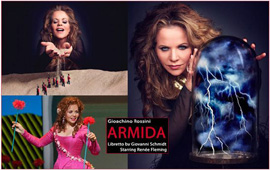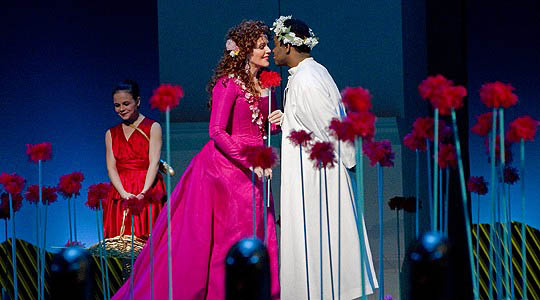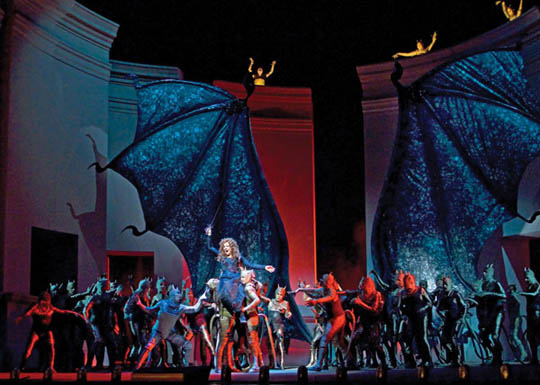An evening at the Opera
Luminița Arvunescu, live from New York
Saturday, 5 March 2011
, 19.00

Radio Romania Musical will broadcast on March 5th, 2011 at 19: 50 pm, a very special "Opera evening": for the first time in 13 years of live broadcasts from the Metropolitan Theatre in New York, the producer of the transmission, Luminița Arvunescu, will be heard from the studio of the International Metropolitan Opera Radio. This is the first time when a Romanian radio producer will comment from the Met show, from the very heart of the event; in addition, only French and Canadian public broadcasters have suggested so far this form of extraordinary public presentation, but so suited to a contemporary approach. Live broadcast frequencies will also be taken on Radio Romania Cultural.
MET's success, a lesson to be learnt
So, after 13 years since the first live satellite reception of a show included in the Season of the European Broadcasting Union (EBU), Opera Evening will be listened to from Metropolitan Opera Radio Studio in New York.
Up to this moment, dozens of performances have been broadcast live - starting with the MET broadcast and performances that opened each season at Teatro alla Scala in Milan and by retrieving the performances of the current season at the Vienna State and Munich Operas: Opera Evenings were broadcast simultaneously on the wavelengths of Radio Romania Music and Radio Romania Cultural, and more recently on the Internet. Being commented live from Radio Romania in the Bucharest Studio, these shows have brought together round the microphone a myriad of artist and specialists in opera shows: you know them, you have listened to their opinions - I would not repeat their names.
But what I do want to emphasize is that the first live broadcast via satellite, in 1998, like this first opera broadcast from outside the institution, on March 5th, is not accidental, here, at the MET. This happens, because after 12 years of live shows and we can add three previous years - when we broadcast performances on virtually all major world scenes, we concluded that no other cultural institution knows to fight more and better, as this famous Lyric Theatre from New York!
And this is the truth:
· I appreciate that MET has won so far, the widest possible audience for its shows - gaining audience in Europe by joining the satellite radio broadcasts in 1993, and monopolizing a huge number of cinemas by its unique formula of High Definition Video for two years ;
· I admire the fact that the opera repertoire has always been approached with an endless respect - avoiding the directors' absurd opera stagings, but always adapting their shows according to the needs and demands of modern audience;
· I admire the quality of the institution to collaborate almost exclusively with the guest stars - which makes it much more interesting for the present;
· and, last but not least, I admire MET`s struggle for quality in each Season - knowing that it is not easy to turn even the best 'material' into a great success every evening.
So, if you naturally wonder - as a matter of fact - 'why do we choose the first broadcast of the Opera Evening to be hosted by the MET?' - Here is the answer: because MET's success is a lesson to be learned by any human or cultural institution.
Why Armida - and not another opera show from the MET
Armida - is one of Rossini's works that has counted fewer revivals both in Europe and the United States; only last year did the MET have its first hearing during the last season.
It has rarely been approached in a recording studio, mainly for the same reason: where could they find three excellent tenors for Rinaldo, Ubaldo and Carlo (and three more, capable of harmonizing with the former in an honourable way?); and furthermore it is not always so easy to find a soprano to impress that much with her only presence enough for a performance or a recording.
In other words, Armida is a rare work: and the moment we listen to it should be treasured forever. In fact, the first revival of the last century was due to Divine Maria Callas; while its first hearing at the MET will remain permanently attached to the name of an American Prima Donna: Renee Fleming.
 Renee Fleming (Armida) si Lawrence Brownlee (Rinaldo) |
A soprano, six tenors, two basses and a conductor...
• The Soprano? Renee Fleming, thus: one of the most difficult female opera roles (Armida), primarily because of its extension within contra alto register, then because of its virtuoso moments, especially in the aria D' amore al dolce impero, for the passion and sensuality that the character must be invested with - and not only in love duets;
• The six tenors? A collection of voices - extremely varied timbers and each one should be of high quality: the first one, of course, Lawrence Brownlee (Rinaldo, Armida`s boyfriend), Kobie van Resburg (Ubaldo) and Barry Banks (Carlo) - the first line; Yeghishe Manucharyan (Eustazio), John Osborn (Goffredo) and Antonino Siragusa (Gernando) - in the second;
• The two basses? Peter Volpe and David Crowford - in minor roles; what about the conductor? - a maestro of Bel-Canto: the Italian Riccardo Frizza.
 |
• A studio that I will share with Vlad Iftinca: the only Romanian that is a part of the great cultural organization , briefly called - the MET, pianist and coach in the Lindemann Young Artist Development Program and a former collaborator of Renata Scotto in her Academy of Music, partner in recitals (at Carnegie Hall, or on other famous stages) for singers: such as Thomas Hampson, Deborah Voigt and Luca Pisaroni - and, besides Vlad Iftinca, there will be two other surprise guests.
• A studio where every minute will possess consistency and which will broadcast for you exclusive interviews with Renee Fleming, Lawrence Brownlee and Riccardo Frizza, all efforts being dedicated to an extraordinary event of Opera Evening, an unforgettable evening.
Translated by Alinda Ivanov and Elena Daniela Radu
MA Students, MTTLC, Bucharest University














